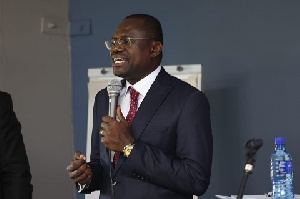Accra, Feb 10, GNA - Mrs Gladys Asmah, the Minster of Fisheries, on Thursday appealed to stakeholders in the fisheries industry to come out with ideas on reducing poverty within fishing communities and to identify opportunity for partnerships. She said the industry had long been under-represented and had further been conspicuously left out of the Ghana Poverty Reduction strategy (GPRS).
Mrs Asmah, who was speaking at a day's workshop on Ghana Post-Harvest Fisheries and Poverty, said there was the need to raise awareness on the important role the sector played in terms of employment, food security, foreign exchange generation as well as poverty reduction.
The workshop aims at bringing to the attention of key decision-makers in the GPRS revision process why post harvest loses should be represented in the GPRS. Mrs Asmah said the fisheries sector was a vibrant one, which provided livelihood for rural communities, employed about 300,000 fishermen, while it also employed about 1.8 million people as processors, transporters and traders.
She said the sector was besieged with numerous challenges such as unstable and declining natural resources resulting in low catches, rising cost of production and declining productivity. Other challenges were low incomes from fisheries enterprises, low levels of skills in education, especially among women, lack of access to health, education, water, sanitation services and large household sizes.
Mrs Asmah said under the Department For International Development (DFID) Post Harvest Fisheries Research Programme two reports have been developed to tackle some of the constraints and mentioned the reports as the Ghana Post-Harvest Fisheries Overview and the Poverty and Post-Harvest Fisheries Livelihood.
Mr Alfred Tetebo, the Director of Fisheries, said the general lack of understanding relating to post harvest fisheries was due to inadequate information and tools available on poverty within the sector. He mentioned the Sustainable Fisheries Livelihoods programme, the Women Development Fund of the Ministry of Women and Children Affairs and the Agricultural Services sub sector Investment Programme as some of the initiatives intended to provide support for poverty alleviation in rural and fishing Communities.
General News of Friday, 11 February 2005
Source: www.ghanaweb.com












